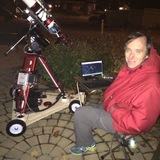INDI Library v2.0.7 is Released (01 Apr 2024)
Bi-monthly release with minor bug fixes and improvements
Alternate single board computer experimenting
- Bob Stephens
-
 Topic Author
Topic Author
- Offline
- Senior Member
-

- Posts: 59
- Thank you received: 9
Alternate single board computer experimenting was created by Bob Stephens
There appears to be a worldwide shortage of Raspberry Pi's (one of the principle suppliers in Australia is talking sometime 2023 for a restock). I've been browsing single board computers to find something that might be useful as an alternative. There are lots around and the following may not be the best choice (and I'm not fully there yet in testing). I don't have an urgent need for additional Pi's but don't like to be dependent on something I can't readily replace.
I'm documenting what I'm up to while it's fresh in my mind in case it's useful to others, prompts a useful discussion, suggestions of alternate boards etc.
Some of this may be a result of my limited level of skill in builds on linux (mostly get by if the instructions are good but not really skillful)
I came across a document describing replacing the OS in an Android TV box with Debian Linux. www.inovato.com/article/install
That only works for a limited range of such boxes. The company sells them pre-configured (www.inovato.com/) but were out of stock of the better ones when I looked and don't ship to Australia. They do make the OS available as per the install document.
I ordered a couple of T95max boxes from Amazon (without the clock on the front despite the image). a.co/d/3mOpioy
4Gig Ram (DDR3), 32Gig Rom, WiFi, Ethernet, 1*USB2, 1*USB3, HDMI, 5V supply and an Allwinner H6 CPU.
I'm only using the GPIO pin's on the Pi's for RTC (Real Time Clocks) when I'm away from home so they are not considered essential for my use. I've not yet worked out if these boxes have an RTC, if not that's unlikely to be an issue. Nicely housed in a case which should give some physical protection (but not rain proof).
I've only setup one so far and limited the second to swapping the OS.
The OS replacement was very easy. Burn the image to an SD card, put the SD card into the box and power it up without the HDMI connected and some mintues later the led on the front changed from red to blue indicating it was ready. It booted with a functional desktop.
Initial attempts to install kstars, ekos and indi were not so great. Kstars and Ekos appeared to install ok but Indi was missing most drivers. Downloading source and building from there didn't resolve that. A more experienced linux person might have a different experience. I did note during that process recommendations to not use Debian but at this stage I don't know if that's possible with these boxes.
I found a script to build kstars etc from source which I now can't relocate the source of (I have the script saved but not the link). Once I renamed the indi and indi-3rdparty directories from my earlier attempts to build them the script ran well.
I have not yet got a VNC server working properly (I'm unable to connect to it remotely) so have not yet tested this in my observatory. I have had a profile configured in Ekos using the expected set of drivers and using the simulators have done a small amount of plate solving
using both online and offline astrometry.net (astap was missing and I have not worked through that).
Timing on the offline solve seemed comparable to what I would expect from my Pi 4 (8GB).
I assume that the remote VNC issue will be solvable, just some more learning for me.
Summary
- I've not completed the testing yet but so far this looks to be a potential alternative to Raspberry Pi's for Observatory control. It's possible but seems unlikely that there may be some other show stopper.
- I think that the T95 max is less powerful than a Raspberry Pi 4 (but have not found a clear comparison especially with both running Linux). Possibly in the range of an RPi 3 but with better storage.
- Storage on the T95 should be more robust than using an SD card or USB drive on the Pi. I think the rom is eMMc .
- Only two USB ports ( with the hub in my ZWO camera and not having the OS on USB that would cover my needs). Limited testing with USB hubs has been seamless.
- No GPIO's.
- Debian may be more troublesome for the KStars, Ekos, Indi stack than other builds.
Please Log in or Create an account to join the conversation.
- Kevin Ross
-

- Offline
- Elite Member
-

- Posts: 421
- Thank you received: 102
Replied by Kevin Ross on topic Alternate single board computer experimenting
I'm currently running an ODroid N2+, which has 6 CPU cores, 4 of which run at 2.4 GHz, and 2 run at 2 GHz, compared to the Raspberry Pi 4's quad cores running at 1.6 GHz. I'm also using eMMC storage, which makes this little computer MUCH faster than a Raspberry Pi. It also has a compatible 40-pin GPIO header (as does the Rock Pi). The best part? Only $83 direct from hardkernel.com.
Please Log in or Create an account to join the conversation.
- Bob Stephens
-
 Topic Author
Topic Author
- Offline
- Senior Member
-

- Posts: 59
- Thank you received: 9
Replied by Bob Stephens on topic Alternate single board computer experimenting
Please Log in or Create an account to join the conversation.
- Rob Lancaster
-

- Offline
- Supernova Explorer
-

- Posts: 2877
- Thank you received: 812
Replied by Rob Lancaster on topic Alternate single board computer experimenting
But I will say that when I developed my AstroPi3 scripts, I really wanted them to be for different OS'es and for different SBC systems like the Odroid, Rock Pi, Orange pi, etc. That's why it is a script instead of an SD card image, so that you can run it on whatever Linux operating system or SBC you like. So you might want to check that out. You can run one of the scripts or you can just use it as a reference for which commands you might need to run.
Please Log in or Create an account to join the conversation.
- Rob Lancaster
-

- Offline
- Supernova Explorer
-

- Posts: 2877
- Thank you received: 812
Replied by Rob Lancaster on topic Alternate single board computer experimenting
Please Log in or Create an account to join the conversation.
- Gilles Gagnon
-

- Offline
- Elite Member
-

- Posts: 294
- Thank you received: 54
Replied by Gilles Gagnon on topic Alternate single board computer experimenting
Please Log in or Create an account to join the conversation.
- Chris Kuethe
-

- Offline
- Premium Member
-

- Posts: 96
- Thank you received: 25
Replied by Chris Kuethe on topic Alternate single board computer experimenting
It'd be nice to have an APT source that could be added to any ARM SBC supported by dietpi, and not all of these support PPAs.
Please Log in or Create an account to join the conversation.
- Bob Stephens
-
 Topic Author
Topic Author
- Offline
- Senior Member
-

- Posts: 59
- Thank you received: 9
Replied by Bob Stephens on topic Alternate single board computer experimenting
After an install of kstars some things started but Ekos failed trying to start up mount and ccd simulators.
I have most things running after some manual steps although Ekos crashes when I try and connect either of my ZWO ASI cameras.
Given how far I've got I might try the rebuild on the other box so I can keep playing while that runs.
Love what you have done here, I'm assuming it's an oddity with my setup .
Please Log in or Create an account to join the conversation.
Replied by nMAC on topic Alternate single board computer experimenting
It's cheap (60eur) it's fast and it works very well. It's basically a Amlogic S905X3 Quad Core ARM Cortex A55, the same as
in the ODroid C4 and with similar configuration. A full desktop/ekos/indi works very well even from an SDcard. There's instructions
to write the OS on the internal EMMC but didn't try that, I wan't to keep it original for now. It has only 2 USB (1xUSB3 + 1xUSB2) ports,
it may require an USB powered hub. An excellent alternative to the RPi.
Please Log in or Create an account to join the conversation.
- Bob Stephens
-
 Topic Author
Topic Author
- Offline
- Senior Member
-

- Posts: 59
- Thank you received: 9
Replied by Bob Stephens on topic Alternate single board computer experimenting
Are you still maintaining the scripts and interested in the details once I've either finished or got as far as I can? If so how what is the best way to pass that on? I don't know that I'll stick with the T95 max long term, the ODroid N2+ looks pretty interesting but am finding the build process interesting and hopefully educational.
Please Log in or Create an account to join the conversation.
- Rob Lancaster
-

- Offline
- Supernova Explorer
-

- Posts: 2877
- Thank you received: 812
Replied by Rob Lancaster on topic Alternate single board computer experimenting
When I was working on developing the scripts in the first place, I ran them many times and set up multiple Pi's, But once I got it all working pretty well, I don't run them all the time. I only need to update or set up a pi every now and then myself. Sometimes people let me know that something is out of date, and if it is, sure I will fix it.
Please Log in or Create an account to join the conversation.
- Bob Stephens
-
 Topic Author
Topic Author
- Offline
- Senior Member
-

- Posts: 59
- Thank you received: 9
Replied by Bob Stephens on topic Alternate single board computer experimenting
Please Log in or Create an account to join the conversation.
